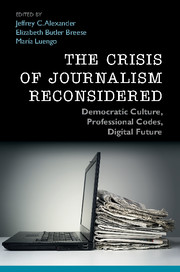Book contents
- Frontmatter
- Dedication
- Contents
- About the Contributors
- Preface
- Acknowledgments
- Introduction: Journalism, democratic culture, and creative reconstruction
- PART I THE CRISIS NARRATIVE
- 1 The perpetual crisis of journalism: Cable and digital revolutions
- 2 The crisis of public service broadcasting reconsidered: Commercialization and digitalization in Scandinavia
- 3 Beyond administrative journalism: Civic skepticism and the crisis in journalism
- 4 The many crises of Western journalism: A comparative analysis of economic crises, professional crises, and crises of confidence
- 5 The crisis in news: Can you whistle a happy tune?
- PART II FEARS OF DIGITAL NEWS MEDIA: THE SYMBOLIC STRUGGLE
- PART III PROFESSIONAL JOURNALISM, CIVIL CODES, AND DIGITAL CULTURE
- Conclusion: News innovations and enduring commitments
- Index
- References
2 - The crisis of public service broadcasting reconsidered: Commercialization and digitalization in Scandinavia
from PART I - THE CRISIS NARRATIVE
Published online by Cambridge University Press: 05 June 2016
- Frontmatter
- Dedication
- Contents
- About the Contributors
- Preface
- Acknowledgments
- Introduction: Journalism, democratic culture, and creative reconstruction
- PART I THE CRISIS NARRATIVE
- 1 The perpetual crisis of journalism: Cable and digital revolutions
- 2 The crisis of public service broadcasting reconsidered: Commercialization and digitalization in Scandinavia
- 3 Beyond administrative journalism: Civic skepticism and the crisis in journalism
- 4 The many crises of Western journalism: A comparative analysis of economic crises, professional crises, and crises of confidence
- 5 The crisis in news: Can you whistle a happy tune?
- PART II FEARS OF DIGITAL NEWS MEDIA: THE SYMBOLIC STRUGGLE
- PART III PROFESSIONAL JOURNALISM, CIVIL CODES, AND DIGITAL CULTURE
- Conclusion: News innovations and enduring commitments
- Index
- References
Summary
In any liberal democracy, independent journalism is understood as the normative ground for which a well-functioning media system is to operate. One institution of independent journalism with a particularly interesting history is public service broadcasting (PSB). After the BBC was founded in 1922, it came to serve as a model for how to regulate radio as a mass medium, and broadcasters regulated by public authorities emerged in several European countries, all avowed with a mission to inform, educate and entertain. As the PSB companies are not dependent on commercial revenues, and are structured so as to keep at arm's length from the government, PSB composes an important part of the infrastructure of a relatively autonomous public sphere.
Several scholars (e.g. Garnham 1992, Scannell 1989) have linked the discussion of PSB to Jürgen Habermas's (1989, 1992, 1996, 2009, ch. 9) theories of the public sphere and deliberative democracy. Habermas's (1989, 27) initial definition of the public sphere is “the sphere of private people coming together as a public.” In his later writings he describes the public sphere in a media society as “an intermediate system of mass communication, situated between the formally organized deliberations and negotiations at the center and the arranged or informal conversations which take place in civil society at the periphery of the political system” (Habermas 2009, 159). Media scholars have argued that PSB possesses the potential to ensure such a unitary public sphere, as a place for rational argumentation on societal issues.
With a cultural sociological (Alexander 2003) approach to journalism another useful term is that of a civil sphere, which also refers to a sphere independent from the market and the state (Alexander 2006, Kreiss, this volume, Luengo 2012). Alexander defines the civil sphere as “a world of values and institutions that generates the capacity for social criticism and democratic integration at the same time. Such a sphere relies on solidarity, on feelings for others whom we do not know but whom we respect out of principle […]” (Alexander 2006, 4). PSB can be viewed as an institution that “generates the capacity for social criticism and democratic integration at the same time.”
- Type
- Chapter
- Information
- The Crisis of Journalism ReconsideredDemocratic Culture, Professional Codes, Digital Future, pp. 43 - 58Publisher: Cambridge University PressPrint publication year: 2016
References
- 5
- Cited by

